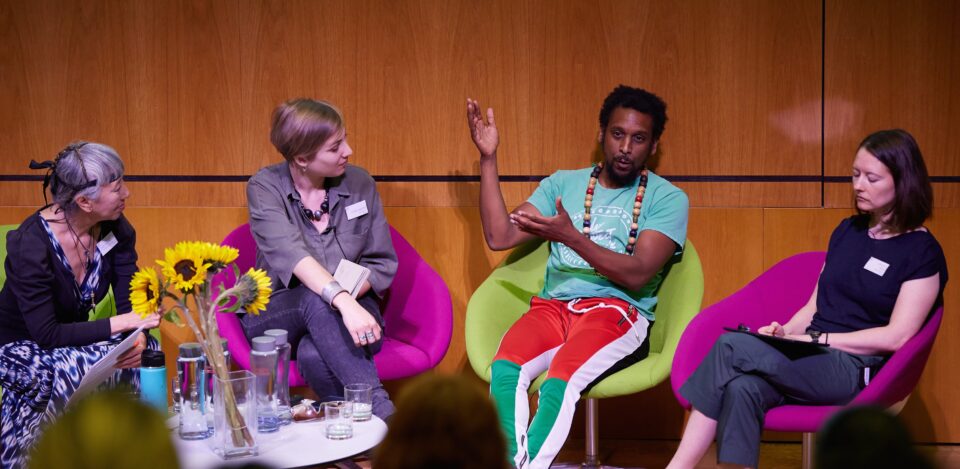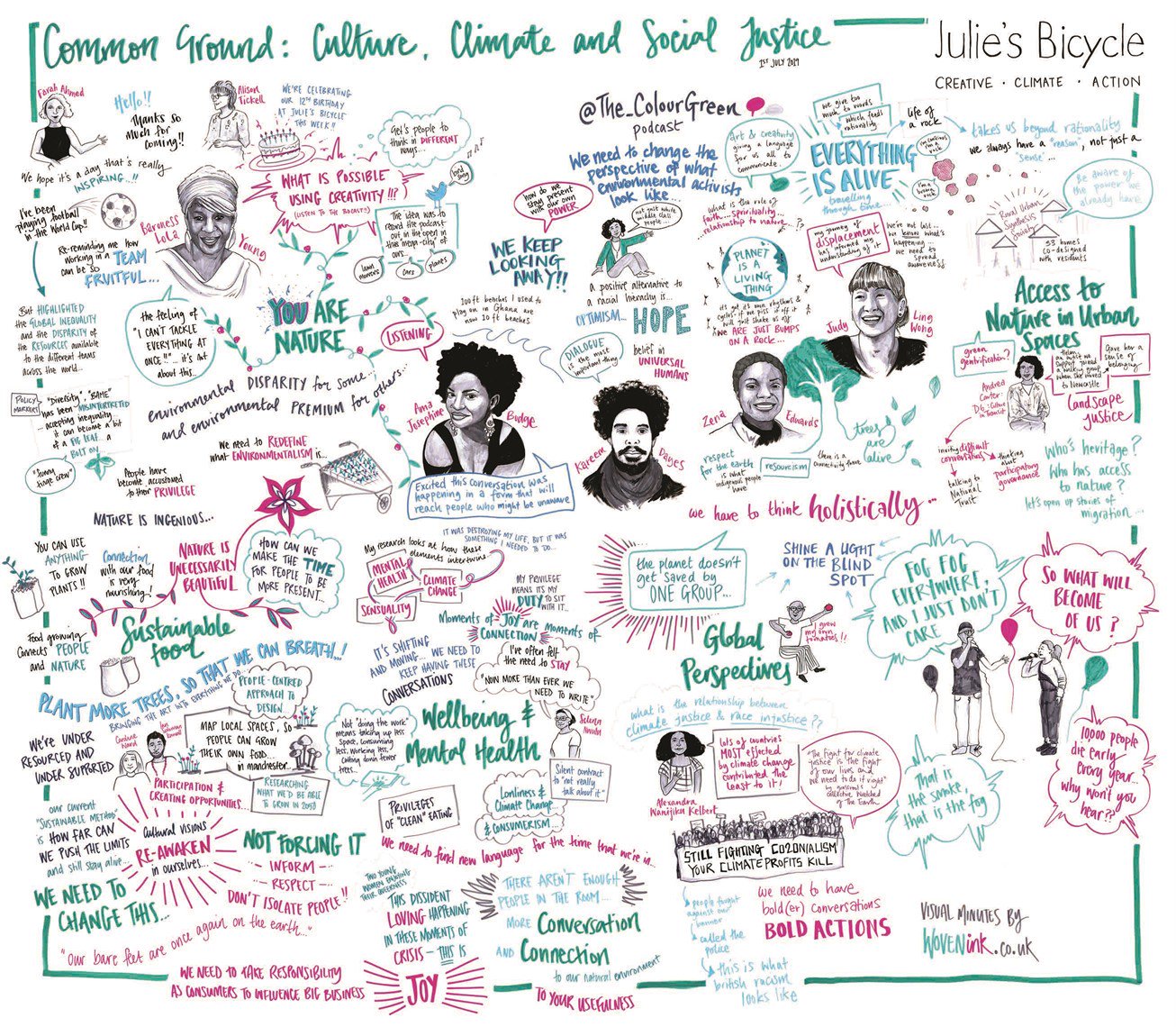- Posted on April 6th, 2021
Common Ground: Round Up

Nearly 100 organisations and practitioners from across the UK came together for ‘Common Ground: Culture, Climate and Social Justice’ to launch the Colour Green podcasts and explore the connections between climate breakdown, inequality and social justice – and the role the arts and wider cultural sector can play in recognising and redressing these imbalances.
It was a packed and provocative day, with a series of talks, in-conversations and performances prompting lively discussions about how the way we eat, inhabit our cities, relate to our local communities, practise self-care, and understand our privilege all play a vital role in the fight for climate justice. The main objective of the day: to inspire creative responses to the climate crisis that are inclusive and encompass broader perspectives and experiences of its impacts and legacy.
Huge thanks to all the speakers and a big shout out to the brilliant performers of Fog Everywhere who finished the day highlighting the impact of pollution on inner city Londoners with such a powerful sonic punch – see them in action as part of the livestream and see full photos on our Facebook gallery.
Lola Young’s Keynote
- Explored her journey into climate justice and why diversity within the environmental movement is so crucial.
- Words such as ‘diversity’ and ‘BAME’ have become misinterpreted as an excuse to accept inequality, and often come across as tokenistic ‘fig leaves’ hiding the uglier systemic realities of racism and inequality.
- We need to change our perspective of what environmental activism looks like – it’s not just a white middle class movement and the sector must embrace these different narratives, especially as those voices left out are those the most impacted now and in the future.
“We have to face that it is environmental disparity for some, environmental premium for others.“
Access to nature in urban spaces
- Andrea Carter of D6 Newcastle stressed the importance of having difficult conversations at this difficult time; we have to ask whose heritage is this land? We need to open up more stories of migration, and see the land as a shared resource – “Migrants are often only talked about from the perspective of the trauma but not the richness of what they bring with themselves.”
- We need to allow new voices, skills and experiences to allow that transformation by bringing them into the development of cultural projects across our cities.
- Projects like walking groups across Newcastle have been hugely empowering for immigrants arriving in the city and have enabled their creative practise and improved wellbeing.
“Being an active agent in making change happen will help you establish a connection with what’s happening around you.“
- Kareem Dayes, founder of Rural Urban Synthesis Society, urged us to embrace the “power we already have”. His own parents legacy of building their own eco-home in Lewisham and pioneering affordable and sustainable living for a low income family is testament to the power of taking that power and agency back:
“Not enough people are aware of what’s possible. We need to be aware of the power we have. We give too much credit to institutions (banks, government etc). I think we have much more power than we realise and we need to become aware and start using it. Developing Social housing requires an amount understanding of how money works and borrowing a lot of it.“
- The perils of ‘green gentrification’: there are stark differences between levels of pollution between neighbouring areas. Privileged communities have organised systems to avoid overpopulation and preserve green spaces. We need to start claiming control over public land and looking after it.
Food Systems
- Caroline Ward of Squirrel Nation in Manchester works to combat the way so many communities are not able to access nature in their own city, and are marginalised from organic farming in particular.
- Working on projects mapping local spaces across the city so people can grow their own food, and setting up a Farm Lab, now creating Oyster mushrooms from recycled coffee grounds; with over 30 coffee shops having donated over 30kg waste coffee.
- Caroline stressed the importance of experiential learning – needing to physically demonstrate issues to make things tangible. Caroline emphasised the huge importance of projects in which participants are dealing with the process of making and sourcing not just the final outcome of consuming food. It is the only way to learn that: “Our current ‘sustainable method’ is how far can we push the limits and still stay alive.“
- Judy Ling Wong, Honorary President of the Black Environment Network:
“When we work with food we can amplify the potential for learning about our natural environment. We can teach everything about nature with a cabbage!“
- It’s vital that we remind ourselves of the importance of taking responsibility as consumers who can influence big business.
- Ian Solomon-Kawall who runs the May Project Gardens in South London started his journey with the simple call-and-response: ‘plant more trees so that we can breathe‘. He is on a mission to reconnect urban communities with nature using Permaculture which works in relation with the land. He feels it’s very important to meet people where they are as they first become involved in nature. “It’s important to celebrate the stories of where people come from and their aliveness, creating an atmosphere of interest and relevance. The connections to food open up these stories that can come pouring out.”
- Look outside of the mainstream “Use the edges and value the marginal”. Some people are absent from the platform as well as the conversation – offering more people a platform is crucial too.
- When working with young people, discuss plant-based foods not veganism – use language and context that is familiar and understandable. We need to frame the emergency around everyday issues that people are facing – “it’s about supporting people on their terms“. Ian summarised the approach perfectly:
“Diversity in nature is what makes the whole system resilient – the same applies to our communities.”
Wellbeing and Mental Health Session
- The climate emergency is causing huge amounts of anxiety and depression across the world. How do we counter this? We have to face this trauma head on through connection, creativity, honesty and self-care.
- Pleasure activist and writer Ama Josephine Budge talked about the power and importance of self-care and connecting with others at this time of emergency:
“Moments of joy are moments of connection…This dissident loving happening in these moments of crisis: this is joy. It’s vital to our mental health to hold onto art – and so integral to social change to think in a creative, holistic way.“
- The power of listening to ourselves was discussed – knowing when to rest and invest in self care – it gives us more time to listen to what’s most important, enables us to regenerate ourselves and be stronger for the changes and challenges ahead.
- Writer and social researcher Selina Nwulu said: “There is an unhealthy silent cultural contract we subscribe to by not talking about the crisis. We must value the importance of learning to sit with these difficult emotions and facts, and then be able to act on them with authenticity.”
- We need to move away from being overwhelmed by climate guilt – we have to reach out and be a bigger collective and not take full weight on our shoulders alone. “When we act from a place of guilt and urgency of ‘there’s no time’, particularly those with power, the action often ends up as white saviourism rather than creating possibility for people to be recognised and empowered.“
- On children and climate anxiety: Don’t just focus on the positive, children and all of us need acknowledgement that it’s real and entirely reasonable that things feel awful sometimes. As Ama pointed out: “Give kids stories of change and transformation – they’re going to have to rebuild the world.“
- We lack the language to make sense of it all. Naming gives clarity, power and collective understanding. More art in public space can help enable this new language and engender better connection. Selina:
“We need to find a new language for the time that we are all in… We have to accept that the certainties of old are gone, certainties are now a privilege and we have to learn to sit with the profound uncertainty of our time.“
Global Perspectives
- Academic and researcher Alexandra Wanjiku Kelbert of Black Lives Matter UK said: “there’s a political decision made every day not to listen to the people living on the frontline of climate change.“
- She highlighted that the ‘climate crisis is a racist crisis’ where “lots of countries most affected by climate change contributed the least to it”, quoting grassroots collective Wretched of The Earth: “The fight for climate justice is the fight for our lives and we need to do it right.”
- Talking about the mainstream environmental movement rallying against the use of the wretched of the earth’s banner with a strong anti-colonial message at a key climate protest, Alexandra:
“There are fundamental structural inequalities built into the current demographics and understanding of what is our current climate movement. Climate Justice must include reparations and redistribution; a greener economy in Britain will achieve very little if the government continues to hinder vulnerable countries from doing the same through crippling debt, unfair trade deals, and the export of its own deathly extractive industries.”
- Poet Zena Edwards talked of the emphasis on ‘resourcism’ – seeing the planet as a thing to be mined, owned and profited from. “It’s vital to learn from and return to indigenous relationships to the land, which is a mutual, two-way exchange, based on need and not greed.”
- Our focus on extraction and resources means that the global powers – predominantly white – are taking control of the planet, evacuating indigenous peoples from their own lands and in the process ‘othering’ them as populations who are anachronistic/archaic – not ‘moving with the times’ and therefore deserved of extinction.
- Zena focused on the power of art and creativity to pave the way, bring communities together consciously to start demanding and living the changes so urgently needed:
“Words and music can move people, they can generate energy, they can literally resonate in the body, which impacts people at a different level than marketing copy can… Talking about art in relation to social justice, let’s talk about our humanity to impact people and start to bring about profound changes.“
In participant’s words:
“I really feel that this is absolutely the direction all environmental discussions need to be moving in – the philosophical and ethical dimensions of every human’s shared custodianship of the earth and the interconnectedness and shared responsibility we have, and the down-to-earth, everyday-ness of this…fighting for a fairer world and fighting against climate change.”
“We need to hear other voices, particularly those from the frontline of climate change. The event provided me with an introduction to both the barriers and opportunities for these conversations to continue. And they need to. Time is running out.”
“Congratulations on the podcast they have entertained and informed me during last weeks commute, I can’t wait to listen to the next in the series.“
Visual Minute Summary from Woven Ink

